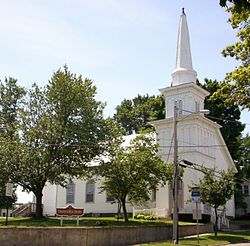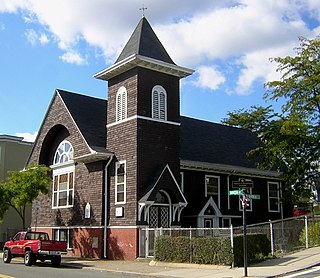
The Baker Congregational Church is a historic Congregational church at 760 Saratoga Street in East Boston, Massachusetts.

The First Congregational Church is an historic church in Stoneham, Massachusetts, United States. Built in 1840, it is a fine local example of Greek Revival architecture, and is a landmark in the town center. It was listed on the National Register of Historic Places on April 13, 1984. The church is affiliated with the United Church of Christ; the current pastor is the Rev. Ken McGarry.

The Common District encompasses the main civic center of Wakefield, Massachusetts. It is centered on the historic town common, just south of Lake Quannapowitt, which was laid in 1644, when it became the heart of Old Reading. The area was separated from Reading as South Reading in 1818, and renamed Wakefield in 1868. The 25 acre district includes the buildings that line the common on Common Street and Main Street, which include the town hall, public library, YMCA, post office, and several churches. It was listed on the National Register of Historic Places in 1990.

The Piety Corner Historic District encompasses one of the oldest settled areas of Waltham, Massachusetts. It is centered on a major road intersection, the junction of Totten Pond Road with Lexington and Bacon Streets, and includes the city's largest single concentration of well-preserved 19th and early 20th-century houses. It extends south from Totten Pond Road along Bacon Street as far as Greenwood Lane, and along Lexington Street to Beaver Street. The district was listed on the National Register of Historic Places in 1990.

Norwichtown is a historic neighborhood in the city of Norwich, Connecticut, United States. It is generally the area immediately north of the Yantic River between I-395 and Route 169.

First Congregational Church of Otto, now known as the Medora Ball Historical Museum, is a historic Congregational church building located at Otto in Cattaraugus County, New York. It was built in 1861 and is in a vernacular Italianate style. The building served as a hub of religious and social life in this rural community. An original steeple was removed in 1917 after being severely damaged by a tornado. The church underwent a major remodeling in 1925. The last regular church service was held in 1946. In 1969, the building was deeded to the Cattaraugus Area Historical Society. It was renamed in 1994 the Medora Ball Historical Museum, after the Otto town historian.

The Congregational Church of Goffstown is a historic Congregational church building in the center of Goffstown, New Hampshire, United States. It is a member of the Conservative Congregational Christian Conference (CCCC).
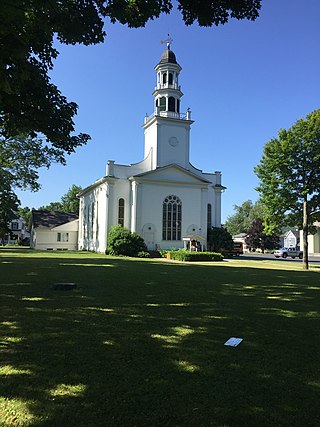
Church Street–Congress Street Historic District is a national historic district located in the village of Moravia in Cayuga County, New York. The district contains 122 contributing buildings and one contributing structure. It is primarily a residential district and preserves several intact examples from the village's earliest period of development, 1810–1830. Numerous residential structures date to the 1830–1840 period and are in the Greek Revival style. This includes the Federal style Congregational Church (1823). Other churches located in the district are the Romanesque style Baptist Church (1874) and the Gothic Revival St. Matthew's Episcopal Church (1897–1898). The district also includes the Powers Library (1880) building and Moravia High School (1924).

First Congregational Church is a historic church located at 30 Hillside Road in Chester Borough, New Jersey. The congregation was founded in 1740. The church building was added to the National Register of Historic Places on August 10, 1977, for its significance in architecture, art, and religion.

The First Presbyterian Church in Lexington, Kentucky is a historic church at 171 Market Street. The church was designed by the important Lexington architect Cincinnatus Shryock who was also an elder at First Church.

Eden Congregational Church, also known as Pioneer Chapel, is a historic church building located just north of downtown Hayward in Alameda County, California. The building was listed on the National Register of Historic Places in 2007. The church is still in use by the Eden United Church of Christ (Congregational). A culverted stretch of San Lorenzo Creek runs past it.
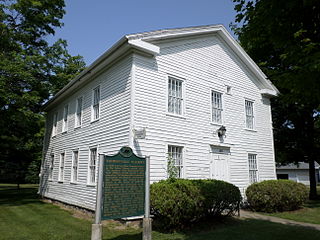
The Vermontville Academy, also known as the First Congregational Chapel, is a building in Vermontville, Michigan, located at 106 North Main Street. It was listed on the National Register of Historic Places in 1972, and is part of the Historic American Buildings Survey. It now serves as the Vermontville Historical Museum.

The First Congregational Church, also known as Iglesia Pentecostes Evangelica Principe de Paz, is a house of worship located in Sioux City, Iowa, United States. An architectural rarity, it is one of a small group of churches in the Prairie School style of architecture. Designed primarily in the Prairie style with some eclectic touches by architect William L. Steele, its horizontal lines are emphasized by Roman brick and crisp rectilinear forms. Somewhat at variance are the distinctive dome and the prominent round heads on the windows.

First Congregational Church, also known as Garnavillo Historical Museum, was a church whose historic building is located on Washington Street in Garnavillo, Iowa, United States. It was built in 1866 and was added to the National Register of Historic Places in 1977.

First Congregational Church of Michigan City is a historic Congregational church building at 531 Washington Street in Michigan City, LaPorte County, Indiana. The church building was built in 1880-1881 and constructed in a Romanesque, Tudor Revival style. It was rebuilt in 1908-1909 following a fire. It is the second oldest church building in Michigan City.

First Congregational Church is a United Church of Christ church located in downtown Atlanta at the corner of Courtland Street and John Wesley Dobbs Avenue .The church has had many prominent members over the years including Alonzo Herndon and Andrew Young. First Congregational Church welcomes people from all racial and economic backgrounds and has a prominent music ministry. The current senior minister, Dr. Reverend Dwight Andrews, is also a professor of music at Emory University.

East Richland Street-East Church Street Historic District is a national historic district located at Kershaw, Lancaster County, South Carolina. It encompasses 28 contributing buildings in a residential section of Kershaw. The majority of the residences date from about 1890 to 1920, a particularly significant period of development in Kershaw. The houses are in a variety of representative architectural styles include Victorian, Queen Anne, Colonial Revival, and Neo-Classical.
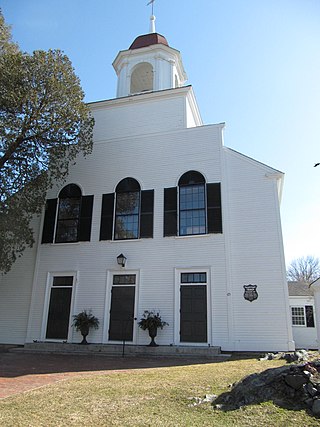
The New Castle Congregational Church is a congregation of the United Church of Christ, located at 65 Main Street in New Castle, New Hampshire. Its church, the only ecclesiastical building in the small community, was built in 1828 by a local master builder, based on the architectural patterns published by Asher Benjamin, and also based in part on the St. John's Church in nearby Portsmouth. It has undergone little alteration since its construction.

The Congregational Church in Exeter is a parish of the United Church of Christ located on Front Street in Exeter, New Hampshire.
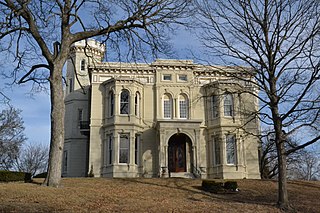
Museum Hill Historic District is a national historic district located at St. Joseph, Missouri. The district encompasses 248 contributing buildings in a predominantly residential section of St. Joseph. It developed between about 1860 and 1942, and includes representative examples of Italianate, Second Empire, Queen Anne, Tudor Revival, American Foursquare, and Bungalow / American Craftsman style architecture. Located in the district is the separately listed Robidoux School. Other notable buildings include the First Congregational Church (1890), Francis Street Methodist Church (1905), First Baptist Church (1896) designed by architect Edmond Jacques Eckel (1845–1934), United Presbyterian Church (1901), First Church of Christ Scientist (1905), First English Evangelical Lutheran Church (1913), and Queen of the Apostles Roman Catholic Church (1908) designed by Eckel.
